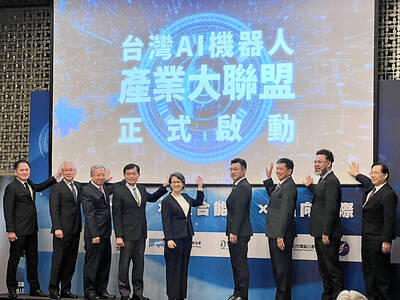South Korean President Lee Myung-bak said yesterday that the country would not accept imports of US beef from cattle more than 30 months old as he negotiates his biggest test yet since taking office 100 days ago.
After protests that have brought thousands of people onto the streets over fears of mad cow disease, the government imposed the limit as a condition for resuming beef imports, which have been intermittently banned for years.
The move risks a standoff with Washington, but may ease public anger which has seen Lee’s popularity ratings tumble by half since he took power.
“It is natural for the government not to import US beef from cattle older than 30 months, if the people are concerned and the majority of the people do not want it,” Lee was quoted as saying by a spokesman.
“The people’s trust in the government has weakened seriously because of this issue,” he told a meeting of Cabinet ministers.
Minister of Agriculture Chung Woon-chun said Seoul would suspend its plans to restart imports until Washington complies with its request not to export beef from older cattle.
“We won’t announce new quarantine conditions until the United States gives an answer to this request,” Chung said on TV.
South Korea lifted its intermittent ban on US beef imports last week. It had imported some US$850 million in US beef a year before the ban was imposed for the first time. An initial accord struck in April called for Seoul to buy almost all beef cuts, including those from cattle more than 30 months old. Older animals are deemed more likely to be a mad cow disease risk.
However, after weeks escalating demonstrations that have led to hundreds of arrests and scores of injured in clashes with police, the government announced late on Monday that it was delaying its resumption of imports.
“It was a measure to humbly accept the people’s will,” Chung said.
Nevertheless, US Ambassador Alexander Vershbow, who met South Korean Foreign Minister Yu Myung-hwan, ruled out renegotiating the April deal.
“We don’t see any need for renegotiation of the agreement since it is based on science,” he was quoted as saying by Yonhap news agency.

The paramount chief of a volcanic island in Vanuatu yesterday said that he was “very impressed” by a UN court’s declaration that countries must tackle climate change. Vanuatu spearheaded the legal case at the International Court of Justice in The Hague, Netherlands, which on Wednesday ruled that countries have a duty to protect against the threat of a warming planet. “I’m very impressed,” George Bumseng, the top chief of the Pacific archipelago’s island of Ambrym, told reporters in the capital, Port Vila. “We have been waiting for this decision for a long time because we have been victims of this climate change for

MASSIVE LOSS: If the next recall votes also fail, it would signal that the administration of President William Lai would continue to face strong resistance within the legislature The results of recall votes yesterday dealt a blow to the Democratic Progressive Party’s (DPP) efforts to overturn the opposition-controlled legislature, as all 24 Chinese Nationalist Party (KMT) lawmakers survived the recall bids. Backed by President William Lai’s (賴清德) DPP, civic groups led the recall drive, seeking to remove 31 out of 39 KMT lawmakers from the 113-seat legislature, in which the KMT and the Taiwan People’s Party (TPP) together hold a majority with 62 seats, while the DPP holds 51 seats. The scale of the recall elections was unprecedented, with another seven KMT lawmakers facing similar votes on Aug. 23. For a

Taiwan must invest in artificial intelligence (AI) and robotics to keep abreast of the next technological leap toward automation, Vice President Hsiao Bi-khim (蕭美琴) said at the luanch ceremony of Taiwan AI and Robots Alliance yesterday. The world is on the cusp of a new industrial revolution centered on AI and robotics, which would likely lead to a thorough transformation of human society, she told an event marking the establishment of a national AI and robotics alliance in Taipei. The arrival of the next industrial revolution could be a matter of years, she said. The pace of automation in the global economy can

All 24 lawmakers of the main opposition Chinese Nationalists Party (KMT) on Saturday survived historical nationwide recall elections, ensuring that the KMT along with Taiwan People’s Party (TPP) lawmakers will maintain opposition control of the legislature. Recall votes against all 24 KMT lawmakers as well as Hsinchu Mayor Ann Kao (高虹安) and KMT legislative caucus whip Fu Kun-chi (傅崐萁) failed to pass, according to Central Election Commission (CEC) figures. In only six of the 24 recall votes did the ballots cast in favor of the recall even meet the threshold of 25 percent of eligible voters needed for the recall to pass,